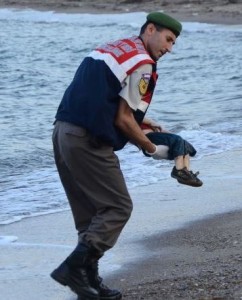The human face of the Europe’s refugee crisis
The familiar and now formulaic debate around the migration crisis in Europe has changed perceptibly in the past few days and it has been the stories of two little boys that have shifted the conversation.
Pictures of a tiny child lying face down in the water at one of Turkey’s main tourist beach resorts have been published on the front pages newspapers all over Europe, putting a human face on the dangers faced by tens of thousands of desperate people who risk their lives to seek a new life in Europe.
The story has sparked horror in Europe as the continent grapples with the biggest humanitarian crisis since the end of World War II.
Wearing a red t-shirt and blue shorts, the child is believed to be one of at least 12 Syrians trying to reach Greece who died when their boats sank.
“If these extraordinarily powerful images of a dead Syrian child washed up on a beach don’t change Europe’s attitude to refugees, what will?” Britain’s Independent thundered in an editorial.
There were also the pleas of a Syrian teenage refugee interviewed by CNN who says “We just want to live in peace. We just want to eat” which have gone viral on YouTube.
The heart-wrenching video shows the boy at the Yamouk Palestinian refugee camp near Damascus also telling how he hasn’t seen his family in a year.
These two stories have turned the argument about how many people each European nation will or should take in into a visceral, raw human issue.
Meanwhile, diplomats from France, Italy and Germany urged a rethink of European rules on asylum to allow for a fairer distribution of migrants throughout the 28-member bloc.
The call came as tensions have reached breaking point between European states over how to tackle the huge influx of asylum seekers and migrants, as thousands more arrived on the Greek mainland.
Over the past week there has been a dramatic spike in the numbers of migrants — mainly from Syria, Afghanistan, Pakistan and Africa — seeking to leave Turkey by sea for Greece in the hope of finding new lives in the European Union.
The Turkish coastguard said two boats had sunk after setting off from the Bodrum peninsula for the Greek Aegean island of Kos early on Wednesday.
Among the dead were five children and a woman, while 15 others were rescued, the coastguard said.
“Do Something, David” the Huffington Post’s UK edition said in a direct appeal to British Prime Minister David Cameron, who has accepted a lower number of asylum seekers in proportion to its population than most other EU countries.
By the end of Wednesday some 40,000 people in Britain had signed a petition urging the government to accept more asylum seekers and increase support for refugees.
“There is a global refugee crisis. The UK is not offering proportional asylum in comparison with European counterparts,” it read.
“We can’t allow refugees who have risked their lives to escape horrendous conflict and violence to be left living in dire, unsafe and inhumane conditions in Europe.”
The government is obliged to respond to any petition with over 10,000 signatures, and if it reaches 100,000 the issue will be considered for debate in parliament.
The Independent newspaper also launched its own campaign, calling for Britain to “accept its fair share of refugees”, which gained 13,600 signatures in hours.
Laurie Nowell
AMES Australia Senior Journalist













